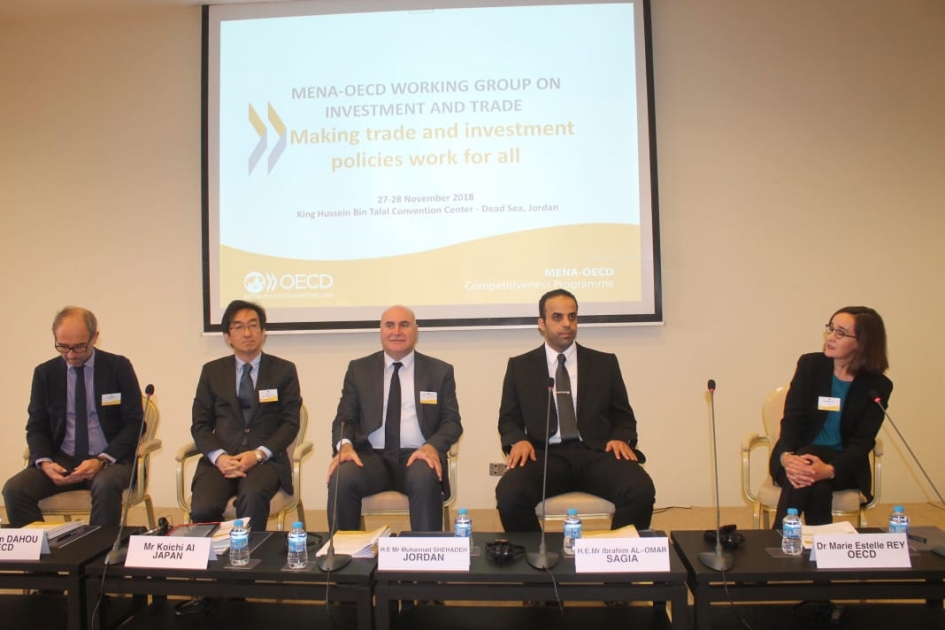
SAGIA at the MENA-OECD Conference: The Kingdom's VISION 2030 has contributed to the Accelerating Pace of Reforms to Enhance Competitiveness of the Saudi Economy
His Excellency the Governor of the Saudi Arabian General Investment Authority (SAGIA), Ibrahim Al-Omar, participated in the annual meeting of the OECD Working Group for the Middle East and North Africa, which commenced on Tuesday in the Dead Sea over a period of two days amid a regional and international presence of ministers, government officials, business leaders and economic and development affairs officials.
At the opening ceremony, SAGIA Governor, Al-Omar gave a speech in which he reviewed the most important updates and developments in the Kingdom relating to the economic and investment aspects of the Kingdom's Vision 2030, as well as the reforms implemented so far to create an attractive and favorable investment environment for domestic and foreign investments.
His Excellency said that the Kingdom is demonstrating great mobility as it rapidly develops and modernizes the country’s investment systems and procedures, a process that will enhance its position on the international investment map and increase the competitiveness of the Saudi economy. He noted that Saudi Arabia has many advantages in international trade and investment, such as its important strategic location linking three continents and forming an ideal bridge between East and West, as well as the presence of diverse natural resources and a youthful workforce, nourished with generous government support of education and training. The government’s efforts in education will raise the level of young national talent and equip them with the skills necessary to meet the challenges of global competition that is dynamically changing.
His Excellency also enforced the Kingdom's achievements, as acknowledged in a number of reports issued by international bodies such as the World Bank, which placed the Kingdom in fourth place among Group of 20 countries in terms of the scope of economic reforms. These reforms have advanced the country’s investment environment and have generated positive expectations by the International Monetary Fund on the Saudi economy and its growth rates over the next few years.
His Excellency, Mr. Mohannad Shehadeh, Minister of State for Jordanian Investment, opened the annual meeting with a speech on the challenges facing the Middle East and North Africa region in providing job opportunities to a large and growing job seekers. He identified investing in the world, integrating into global value chains, stimulating local investment, and expanding partnerships with the private sector as essential next steps, especially as the Middle East and North Africa region holds one of the most important keys to global trade through the rich resources and immense potential created by its geographical location bridging Eastern and Western markets.
The Jordanian Minister of Investment stressed the importance of optimism about the commercial and investment capabilities of the MENA region, and he expressed confidence that the region’s journey towards a comprehensive and sustainable future, with good job opportunities and conditions for all youth, will progress quickly.
Following the opening ceremony, and speaking at a session focused on discussing investment regulations and policies, Deputy Governor of Investment Climate, Dr. Ayed bin Hadi Al-Otaibi, revealed that the Kingdom has submitted a new model for a unified agreement for Arab capital investment, which has been unanimously approved.
He stressed that the role of governments is central in providing the legislative structure and legal frameworks that contribute to the growth in inter-regional investments of the countries of the region. He also underscored the need to work on a collective agreement to promote and protect investments that enhance economic development efforts, as well as the importance of finding clear mechanisms to limit the constraints of investment abroad and provide appropriate solutions.
In addition, he highlighted that governments need to intensify bilateral meetings between the business sector and various institutions in the region. He also recommended the expansion of joint business councils aimed at helping to target private sector investments towards areas that will facilitate economic integration between countries, leveraging each country’s comparative advantage. Finally, he proposed the establishment of regular forums and specialized exhibitions, as these create an ideal platform for engagement between governments and business communities.


























